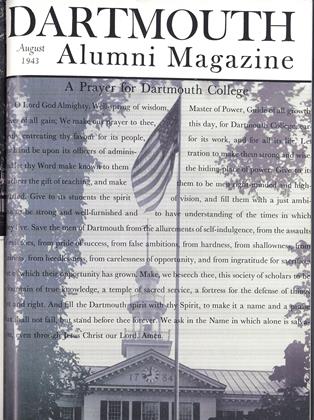AN IMPORTANT BEQUEST, greatly enriching the collections in Baker Library and giving Dartmouth College possession of nearly all the personal library of George Ticknor, 1807, great American scholar and literary figure of the igth century, was disclosed in mid-July.
This gift from the late William Dexter of Boston, descendant of the daughter of the famous Dartmouth scholar, includes some 4,700 volumes, covering classical, Italian, German and French literature, English and American literature, and associated history and biography, many of them rare or signed editions; and a number of superb French bookcases in which they were originally kept. Mrs. Dexter has also placed on indefinite loan two oil portraits of Ticknor, one as a youth, by Sully, and the other as a grown man, by Healy.
The Ticknor collection, which the scholar used essentially as a working library for his own studies and writings and for his teaching at Harvard, has been described as perhaps the finest collection which has come to the College in its modern history. The College plans, after the war, to recreate the Ticknor library in a special room.
Although not collected by Ticknor as such, many rare and interesting volumes are in the Dexter gift. Presentation copies from Byron, Thackeray, and Holmes; first editions of Dickens' "Christmas Carol" and Cooper's "Last of the Mohicans"; inscribed copies from Elizabeth Barrett Browning and Phyllis Wheatley; and a 1458 manuscript in Spanish are but a few of the volumes which add to its richness.
Also included in the library are 18 bound volumes of Ticknor's own manuscript journals—the basis for the "Life and Letters" which followed his death—and a number of bound volumes of his note- books, some written during his European travels and others during his career as Professor of French and Spanish Language and Literature and Belles-Lettres at Harvard from 1816 to 1835.
Although a Dartmouth graduate, Ticknor's scholarly career has long been associated with Harvard, where he taught for 19 years. His early brilliance is indicated by the fact that President Wheelock accepted him for admission here at the age of 11, although he entered somewhat later and graduated at 16. Dartmouth awarded him the Master's degree and, in 1858, the honorary degree of Doctor of Laws.
 View Full Issue
View Full Issue
More From This Issue
-
 Article
ArticleDARTMOUTH WAR DIRECTORY
August 1943 -
 Lettter from the Editor
Lettter from the Editor'Round the Girdled Earth
August 1943 -
 Article
ArticleOpportunity for Improvability
August 1943 -
 Class Notes
Class Notes1934
August 1943 By JOHN W. KNIBBS III -
 Class Notes
Class Notes1918
August 1943 By ERNEST H. EARLEY -
 Class Notes
Class Notes1937
August 1943 By JOHN H. DEVLIN JR.







